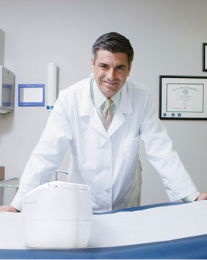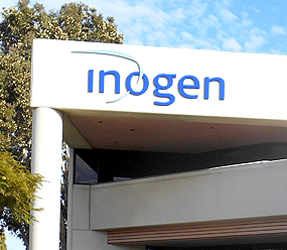What Is Shortness of Breath?
Shortness of breath, also called dyspnea, is the inability to get enough air. It is not uncommon for breathlessness to create a feeling of panic and anxiety as you struggle for breath. Shortness of breath is often accompanied by a tightening or heavy sensation in the chest, along with gasping or hungering for air, and it can feel as though you are going to suffocate. Needless to say, feeling shortness of breath causes significant discomfort, and can be quite a frightening experience. Discovering the reasons for breathlessness in your life can help alleviate the fear and will ultimately help you find the right shortness of breath treatment for you.[1,2]
WHAT CAUSES SHORTNESS OF BREATH IN COPD?
So, what causes breathlessness? COPD, or chronic obstructive pulmonary disease, causes damage to the lungs, which makes it more difficult to breathe. People with COPD must exert more effort to inhale and exhale air properly, which can result in feeling short of breath. Additionally, COPD is associated with both emphysema and chronic bronchitis, both of which cause shortness of breath. The breathlessness associated with emphysema results from damage to the air sacs in the lungs, in which either the walls that separate the air sacs are destroyed or they lose their stretchiness. Chronic bronchitis, on the other hand, causes shortness of breath because airways become partly blocked by irritation that causes inflammation and swelling, and because the lungs produce excess mucus.[3] COPD is just one of many causes of shortness of breath. Regardless of what causes shortness of breath, it can be a terrifying feeling and one that should be managed.[3]
SHORTNESS OF BREATH: SIGNS OF A FLARE-UP[3]
What causes breathlessness to increase in COPD? If you are feeling short of breath more often than normal, or experiencing increased shortness of breath symptoms, these may be signs of COPD flare-up or exacerbation. Increased shortness of breath can also indicate respiratory infections, pneumonia or flu, all of which are known reasons for shortness of breath and can lead to COPD exacerbation and the possibility of hospitalization. If you are experiencing more shortness of breath than usual, contact your doctor right away to ensure that your symptoms do not worsen.
SHORTNESS OF BREATH FROM COPD
Shortness of breath treatment depends on the underlying cause and duration of symptoms. Once that is determined, you and your physician can work together to create a treatment plan.[1] Breathlessness caused by COPD can be treated and managed in several ways. First of all, taking any prescribed COPD medicines regularly – and in the right way – is very important.[3] Taking part in a pulmonary rehabilitation program can greatly improve quality of life by helping people with chronic conditions safely improve their fitness and learn how to manage their symptoms.[1] For some patients in the later stages of COPD, oxygen therapy can help decrease shortness of breath.[3]
USING SUPPLEMENTAL OXYGEN FOR SHORTNESS OF BREATH
In many cases, oxygen therapy helps increase oxygen intake, which can reduce the feeling short of breath. Oxygen therapy can also help improve your ability to remain active, increase your stamina and help you feel more alert. It is important to understand that your health care providers prescribe oxygen therapy to help you manage your disease and shortness of breath symptoms so you may be able to carry out normal, everyday functions. If your chronic breathlessness, whether it is due to COPD or another cause, is impacting your ability to live a full life, ask your doctor or health care team today if you might benefit from oxygen therapy today.[4]
If your doctor / healthcare team feels that oxygen therapy is the right treatment to help manage your shortness of breath, consider an Inogen One portable oxygen concentrator. Inogen offers portable oxygen concentrators that provide medical grade oxygen, all day, every day, at home or away. Our small, lightweight portable oxygen concentrators allow you to get the supplemental oxygen you need and provide travel portability for a patient’s active lifestyle.
Contact Inogen today and find how our portable oxygen concentrators may help.
FREQUENTLY ASKED QUESTIONS: SHORTNESS OF BREATH
Is shortness of breath a lung problem?
Shortness of breath can be a sign that your lungs or your heart are not working as they should. Breathlessness may indicate that you are not getting the oxygen you need or that your body is not properly eliminating carbon dioxide. That problem can originate in the lungs, or it can be a problem with how your heart is working or circulating your blood.2 However, other conditions can cause shortness of breath, too, including anemia, anaphylaxis, anxiety, broken ribs, choking, obesity and more.1 See your doctor to determine the reasons for shortness of breath that you’re experiencing.
What causes shortness of breath most often?
The most common chronic, or long-term, shortness of breath causes are asthma, COPD, heart problems, lung disease or obesity.1 The most common acute, or sudden, causes of breathlessness are allergic reactions, asthma attacks, blockage in the respiratory tract from choking or mucus, blood clots in the lungs, heart attack or heart failure, pregnancy or respiratory infections.[2]
Can muscle pain cause shortness of breath?
Often, back pain and breathlessness result from a muscle strain or carrying extra weight. However, sometimes a more serious condition can cause back pain with shortness of breath, and the person requires prompt medical attention. Someone experiencing these symptoms with chest pain, sweating, nausea, dizziness, or loss of consciousness should see their doctor immediately or seek emergency care. They can indicate a heart attack.[4]
When should I be concerned about shortness of breath?
You should seek emergency medical care, call 911 or have someone drive you to emergency care, if you experience: severe shortness of breath that comes on suddenly and affects your ability to function, if your shortness of breath is accompanied by chest pain, fainting, nausea, a bluish tinge to lips or nails, or a change in mental alertness, as these may be signs of a heart attack or pulmonary embolism. See your doctor as soon as possible if your shortness of breath is accompanied by swelling in your feet and ankles, trouble breathing when you lie flat, wheezing, high fever, chills and cough.[1]
Managing My Shortness of Breath
The following self-care steps may help chronic shortness of breath from worsening:[1]
- Quit smoking, or don’t start. If you have COPD, quitting can slow the progression of the disease and prevent complications.
- Avoid exposure to pollutants, such as chemical fumes or secondhand smoke.
- Avoid extremes in temperature which may magnify the dyspnea caused by chronic lung diseases.
- Exercise regularly to improve physical fitness and the ability to tolerate activity. Talk to your doctor before starting an exercise program.
- Take all your medications, as directed by your physician.
- Regularly check your equipment. If you rely on supplemental oxygen, be sure your supply is adequate and the equipment works properly.
- When traveling to areas with higher altitude, take time to adjust and avoid exertion until then.
- Have an action plan- discuss with your doctor what to do if your symptoms become worse.
References
- Shortness of Breath. Mayo Clinic, Mayo Foundation for Medical Education and Research, 13 June 2020, www.mayoclinic.org/symptoms/shortness-of-breath/basics/definition/sym-20050890.
- Schwartzstein RM, Patient Education: Shortness of Breath (Dyspnea) (Beyond the Basics). Up-to-date, Up-to-date, Inc., 9 June 2020, www.uptodate.com/contents/shortness-of-breath-dyspnea-beyond-the-basics.
- COPD.net-symptoms-shortness-of-breath.
- Oxygen Therapy (verywellhealth.com)
- Galan N, Back Pain and Shortness of Breath: 10 Causes. Medical News Today, MediLexicon International, 5 Feb. 2019, www.medicalnewstoday.com/articles/324364#pneumonia.










